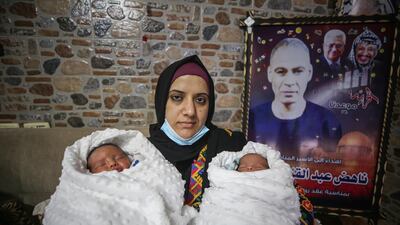In a home crowded with loved ones, Palestinian Rasmia Hmaid cradles twin baby boys Hamam and Hani after introducing them to the world on Saturday.
The delivery by cesarean section in a Gaza hospital was perfectly routine – though everything before the birth was anything but ordinary. Rasmia says her twin sons were born after sperm was smuggled from an Israeli prison.
Her husband Nahad Hmaid, 41, a member of the armed wing of the Fatah party, was imprisoned in Israel in 2007 after being captured by Israeli forces. He has now served more than 14 years of his 20-year sentence.
Rasmia said the names of the boys were chosen by their father and she could not wait until the day her husband left prison.
“Nahad gave me the most beautiful gift. He gave me Hamam and Hani,” Rasmia, 32, told The National while cradling her sons in thick white blankets.
Rasmia got engaged to Nahad in 2018 while he was serving his sentence and the pair had not met before that.
“Our first meeting was inside the prison,” she said. “I was feeling really shy. Afterwards I was counting days until I could meet him again.”
They married in a Gaza court in April 2018. Until three years ago, Rasmia was allowed to visit Nahad regularly. But she has not been allowed to return for the past two years as Israeli authorities deny her permission to visit.
“It was Nahad’s idea for us to get pregnant, I was afraid to take this step but he encouraged me,” said Rasmia. “It was a big risk for both of us to do this.”

Rasmia says Nahad’s sperm was smuggled out of the prison a year ago – though the Israeli Prison Service said there is no evidence that the incident took place.
Those who attempt to smuggle anything out of Israeli prisons could face severe punishment including police investigation, isolation and denial of visits, the Israeli Prison Service told The National.
"We take smuggling incidents to and from prison seriously and use all the criminal, administrative and disciplinary measures available to prosecute prisoners who are suspected of attempted smuggling,” it said.
“These include ordering police investigations, isolation [of prisoners] and denial of their visits and benefits.
"It is important to stress that the Israeli Prison Service has never been presented with scientific evidence that there was a sperm smuggling [incident], which resulted in a baby being born, and the same is true of this claim."
Rasmia said she underwent in-vitro fertilisation (IVF) as soon as the sperm reached Gaza. The first attempt failed, she said, but a second attempt eight months later was successful.
“The sperm can remain viable for 12 hours, depending on the quality,” IVF specialist Dr Nadia Al Ghalayni told The National.
Dr Al Ghalayni said she had carried out several fertilisations of prisoners’ wives. She said she offers procedures for free, where usually each attempt costs about $1,200.
“When we receive the sperm, we freeze it immediately,” she said.
101 babies born to prisoners
Blue decorations now hang on the wall of Rasmia’s family home in Gaza City. A photo of Nahad sits in the corner of the room alongside pictures of former and current Palestinian presidents Yasser Arafat and Mahmoud Abbas.
Nahad was captured in Beit Hanoun city, north of the Gaza Strip, by Israeli forces in 2006. He is now imprisoned in Nafha Prison in southern Israel where he waits to finish the remaining years of his sentence before being reunited with his family.
“When Nahad was captured, he was 27 years old,” said his brother Abed AlKader Hmaid.
“At that time, he was single and didn’t think he would get married and start a family, but after spending all of these years inside the prison, he wished to start a family.”
About 101 babies have been born to prisoners in Israeli jails, said Moafak Hmaid of the Hussam society for prisoners and freed prisoners.
“Those babies are not recognised by Israel,” he said.
“But the Palestinian Authority supports them and issued identity certifications and Palestinian passports to them. They can practice their life normally, but Israel doesn’t allow them to visit their fathers inside the prison.”
Rasmia’s mother Intesar Abu Omira, 64, is helping the new mother to raise the twins before their father comes home. She said she had offered them any help that they might need.
“It is a victory for us and our happiness can’t be described."

